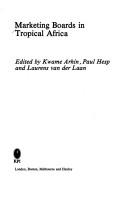| Listing 1 - 7 of 7 |
Sort by
|
Book
Abstract | Keywords | Export | Availability | Bookmark
 Loading...
Loading...Choose an application
- Reference Manager
- EndNote
- RefWorks (Direct export to RefWorks)
Book
Abstract | Keywords | Export | Availability | Bookmark
 Loading...
Loading...Choose an application
- Reference Manager
- EndNote
- RefWorks (Direct export to RefWorks)
Cooperative marketing of farm produce --- Cooperative marketing of farm produce --- Farmers --- Farmers --- Marketing boards --- Marketing boards
Book
ISBN: 0821313274 Year: 1989 Publisher: Washington World Bank
Abstract | Keywords | Export | Availability | Bookmark
 Loading...
Loading...Choose an application
- Reference Manager
- EndNote
- RefWorks (Direct export to RefWorks)

ISBN: 071030109X Year: 1985 Publisher: London KPI
Abstract | Keywords | Export | Availability | Bookmark
 Loading...
Loading...Choose an application
- Reference Manager
- EndNote
- RefWorks (Direct export to RefWorks)
#SBIB:39A4 --- #SBIB:39A73 --- Marketing boards --- -Boards, Marketing --- Commodity boards --- Produce trade --- Toegepaste antropologie --- Etnografie: Afrika --- Congresses --- Social Sciences and Humanities. Marketing --- Congresses. --- Marketing Policy and Strategy --- -Toegepaste antropologie --- Marketing Policy and Strategy. --- Boards, Marketing
Book
Year: 2007 Publisher: Washington, D.C., The World Bank,
Abstract | Keywords | Export | Availability | Bookmark
 Loading...
Loading...Choose an application
- Reference Manager
- EndNote
- RefWorks (Direct export to RefWorks)
Statutory marketing boards that have exclusive authority to purchase domestic production, sell for export, and set purchase and sales prices of commodities are a type of state trading enterprise that is subject to World Trade Organization disciplines. This paper assesses a recent dispute brought by the United States against Canada, alleging that WTO rules require state trading enterprises to operate solely in accordance with commercial considerations and that the Canadian government did not require the Canadian Wheat Board to do so. The panel and Appellate Body found that the primary discipline of the WTO regarding state trading enterprises was nondiscrimination, and that operating on the basis of "commercial considerations" was not an independent obligation. Instead, WTO disciplines regarding the pricing behavior of state trading enterprises use a "commercial considerations" test as a possible indicator of discrimination. Although a significant degree of price discrimination is observed in the case of Canadian wheat exports, there are economic arguments why this might also be pursued by a private, profit maximizing firm.
Access to Markets --- Domestic market --- Dumping --- Economic Theory and Research --- Emerging Markets --- Export markets --- International Economics & Trade --- Law and Development --- Macroeconomics and Economic Growth --- Market access --- Market price --- Marketing --- Marketing boards --- Markets and Market Access --- Price discrimination --- Private Sector Development --- Sale --- Sales --- Trade Law
Book
Year: 2007 Publisher: Washington, D.C., The World Bank,
Abstract | Keywords | Export | Availability | Bookmark
 Loading...
Loading...Choose an application
- Reference Manager
- EndNote
- RefWorks (Direct export to RefWorks)
Statutory marketing boards that have exclusive authority to purchase domestic production, sell for export, and set purchase and sales prices of commodities are a type of state trading enterprise that is subject to World Trade Organization disciplines. This paper assesses a recent dispute brought by the United States against Canada, alleging that WTO rules require state trading enterprises to operate solely in accordance with commercial considerations and that the Canadian government did not require the Canadian Wheat Board to do so. The panel and Appellate Body found that the primary discipline of the WTO regarding state trading enterprises was nondiscrimination, and that operating on the basis of "commercial considerations" was not an independent obligation. Instead, WTO disciplines regarding the pricing behavior of state trading enterprises use a "commercial considerations" test as a possible indicator of discrimination. Although a significant degree of price discrimination is observed in the case of Canadian wheat exports, there are economic arguments why this might also be pursued by a private, profit maximizing firm.
Access to Markets --- Domestic market --- Dumping --- Economic Theory and Research --- Emerging Markets --- Export markets --- International Economics & Trade --- Law and Development --- Macroeconomics and Economic Growth --- Market access --- Market price --- Marketing --- Marketing boards --- Markets and Market Access --- Price discrimination --- Private Sector Development --- Sale --- Sales --- Trade Law
Book
Year: 2006 Publisher: Washington, D.C., The World Bank,
Abstract | Keywords | Export | Availability | Bookmark
 Loading...
Loading...Choose an application
- Reference Manager
- EndNote
- RefWorks (Direct export to RefWorks)
The main objective of this paper is to provide estimates of the cost of moving out of subsistence for Madagascar's farmers. The analysis is based on a simple asset-return model of occupational choice. Estimates suggest that the entry (sunk) cost associated with moving out of subsistence can be quite large - somewhere between 124 and 153 percent of a subsistence farmer's annual production. Our results make it possible to identify farm characteristics likely to generate large gains, if moved out of subsistence, yielding useful information for the targeting of trade-adjustment assistance programs.
Access to Markets --- Agribusiness --- Agriculture --- Commercial Farming --- Crops and Crop Management Systems --- Debt Markets --- Economic Theory and Research --- Expenditure --- Fair --- Finance and Financial Sector Development --- International Economics & Trade --- Macroeconomics and Economic Growth --- Market --- Market Disruption --- Market Entry --- Market Failures --- Market Prices --- Market Reforms --- Market Structure --- Marketing --- Marketing Boards --- Markets --- Markets and Market Access --- Middlemen --- Poverty Reduction --- Price --- Producer Prices --- Product --- Products --- Rural Development --- Rural Poverty Reduction --- Supply --- Value
| Listing 1 - 7 of 7 |
Sort by
|

 Search
Search Feedback
Feedback About UniCat
About UniCat  Help
Help News
News